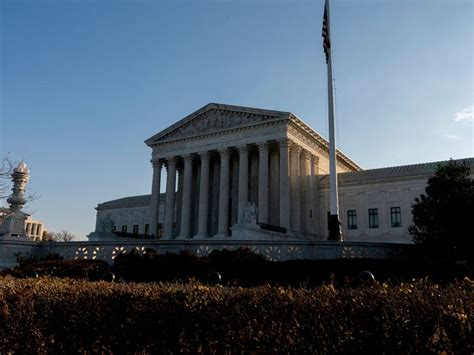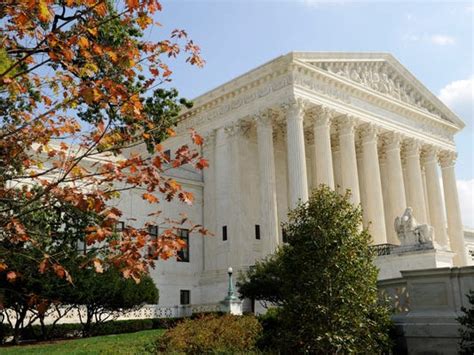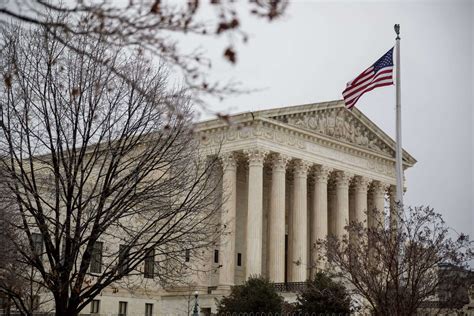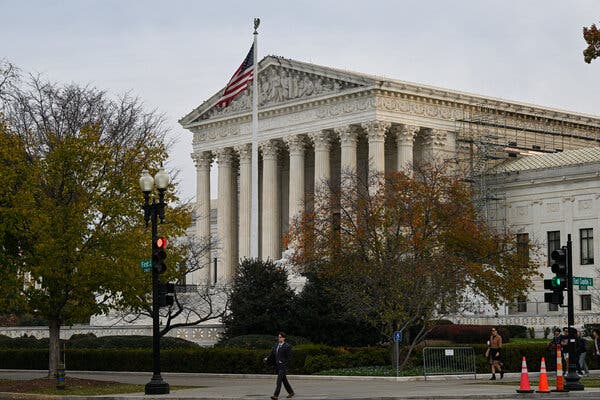The Supreme Court of the United States (SCOTUS) plays a pivotal role in shaping the nation’s legal landscape, particularly in matters concerning family law and relationships. In 2024, a series of landmark decisions have drawn significant public attention, reflecting the evolving social norms and complex legal challenges of our time. This article delves into the most impactful SCOTUS rulings of the year, examining their judicial reasoning, legal precedents, and far-reaching consequences. By understanding these decisions, legal practitioners and affected individuals can better navigate the immediate and long-term implications for family relationships, ensuring they stay informed and prepared for the changes ahead.
Explore this topic with bzcat.xyz in great detail.
1. Significance of SCOTUS in U.S. Legal Framework
The Supreme Court of the United States (SCOTUS) stands as the highest court in the land, wielding the ultimate authority to settle constitutional and legal disputes. Its rulings profoundly shape American society, defining the meaning of laws and impacting public policy nationwide. SCOTUS holds a singular position within the U.S. legal system, addressing complex legal questions with far-reaching consequences, especially in areas such as family law, civil rights, and social justice.
The Supreme Court of the United States (SCOTUS) holds immense significance due to its power to interpret the Constitution and establish legal precedents that bind lower courts and influence legislative action. SCOTUS rulings often resolve contentious legal issues, bringing clarity and consistency to the application of laws across the nation. This crucial role ensures a balance of power among the branches of government and enables laws to adapt to evolving societal values.
The Supreme Court of the United States (SCOTUS) plays a pivotal role in family law, its decisions shaping legal standards regarding marriage, parental rights, and child custody, to name a few. As societal norms and values shift, SCOTUS rulings act as a vital mechanism for adjusting legal principles to contemporary issues, demonstrating the Court’s enduring influence on the American legal system.

2. Increasing Public Interest in Family Law
Public interest in family law has surged in recent years, driven by societal shifts and evolving family dynamics. Issues such as marriage equality, parental rights, and child custody have become central to national conversations, reflecting broader changes in how families are defined and protected under the law. High-profile cases and significant Supreme Court decisions have further heightened public awareness, prompting more individuals to follow legal developments closely.
As family structures diversify, so do the legal challenges associated with them. The increasing complexity of family law cases has led to greater scrutiny of how laws are applied and interpreted, particularly in the context of constitutional rights and social justice. This growing interest underscores the importance of staying informed about legal trends and understanding their potential impact on everyday life. The public’s engagement with family law issues highlights the vital role of the judiciary in shaping the legal landscape that governs personal relationships.

3. Evolving Social Norms and Legal Challenges
Evolving social norms have significantly influenced the legal challenges faced by the U.S. judiciary, particularly in the realm of family law. As societal attitudes towards marriage, gender roles, and family structures continue to shift, the legal system must adapt to address these changes. Issues such as same-sex marriage, surrogacy, and transgender rights have emerged as pivotal areas where traditional legal frameworks are being tested and redefined.
These changes often lead to complex legal disputes that require nuanced interpretation of existing laws and, in some cases, the creation of new legal precedents. The Supreme Court’s role in addressing these challenges is crucial, as its decisions help to clarify and guide how laws should be applied in light of contemporary values. The interplay between evolving social norms and the legal system underscores the dynamic nature of family law, where courts must continually balance respect for tradition with the need to accommodate modern realities. This ongoing evolution presents both challenges and opportunities for legal practitioners and the public alike.

4. Analysis of Major 2024 SCOTUS Rulings
The year 2024 has witnessed a series of impactful Supreme Court decisions that have fundamentally altered the legal framework governing family law in the United States. These rulings, tackling pivotal matters like parental rights, child custody arrangements, and the legal acknowledgment of diverse family configurations, underscore the Court’s persistent endeavor to interpret the Constitution in a manner that resonates with contemporary social norms.
A landmark decision addressed the adoption rights of same-sex couples. The Court affirmed the principle of equal treatment in adoption, regardless of sexual orientation. This ruling strengthened the legal protections for LGBTQ+ families, prohibiting states from discriminatory practices in adoption. It established a clear precedent for future cases, ensuring fair access to adoption for all couples.
Interstate child custody disputes presented a complex challenge, and the Court’s decision provided crucial clarity on jurisdictional matters. This ruling simplifies the legal process, enabling parents to navigate the system more easily and resolve custody battles efficiently. The aim is to minimize the emotional and financial burdens often associated with such disputes, ultimately benefitting families involved in these difficult situations.
The Supreme Court’s 2024 rulings demonstrate its critical role in meeting the evolving needs of American families. By interpreting and applying the law in accordance with present social norms, the Court continues to shape the trajectory of family law and ensure the safeguarding of individual rights within families.
5. Judicial Reasoning and Legal Precedents
The judicial reasoning behind the 2024 Supreme Court rulings in family law reflects a careful balance between upholding established legal principles and adapting to the evolving social landscape. The justices meticulously analyzed the Constitution, relevant statutes, and prior case law to arrive at decisions that not only address the specifics of each case but also set important legal precedents for the future.
In cases involving same-sex adoption rights, the Court emphasized the constitutional guarantee of equal protection under the law. By interpreting the Fourteenth Amendment to extend these protections to all families, the justices reinforced the idea that state laws must operate without discrimination. This reasoning aligns with previous landmark decisions that have expanded civil rights, demonstrating the Court’s commitment to ensuring equality for all citizens.
Similarly, in the rulings on interstate child custody, the Court relied on the principle of jurisdictional clarity, rooted in the Full Faith and Credit Clause of the Constitution. The justices reasoned that consistent application of custody laws across state lines is essential to protect the welfare of children and to prevent legal chaos.
These decisions are not just isolated judgments; they serve as legal precedents that will guide lower courts and shape the interpretation of family law for years to come. The Court’s reasoning underscores its role in both preserving the integrity of the legal system and responding to contemporary societal changes.
6. Implications for Lower Courts and State Laws
The 2024 Supreme Court rulings have significant implications for lower courts and state laws, particularly in how they interpret and apply family law. With the Supreme Court setting new legal precedents, lower courts are now required to align their decisions with these rulings, ensuring consistency in the legal treatment of similar cases across the country. This is especially critical in areas where state laws previously varied or conflicted with each other.
The ruling on same-sex adoption rights establishes a nationwide standard, requiring all states to treat LGBTQ+ couples equally in adoption proceedings. This decision supersedes any state laws or policies that previously allowed for discrimination. States must now adapt their legal frameworks and administrative practices to align with the Court’s directive. Lower courts will be essential in ensuring the implementation of these changes and safeguarding the rights of individuals impacted by the ruling.
The Supreme Court has provided clear guidance on jurisdictional issues in interstate child custody disputes. Lower courts must now follow these newly established guidelines. This change is expected to result in more predictable outcomes in custody cases and minimize the chance of conflicting rulings between different states.
These rulings have broad implications, promoting consistency in family law and solidifying the principle of equal protection under the law across all levels of the judiciary.
7. Immediate Impacts on Family Relationships
The Supreme Court’s 2024 rulings have significantly impacted family relationships nationwide. The decision upholding equal adoption rights for same-sex couples has been a major victory for LGBTQ+ families, granting them the same legal standing and protection as heterosexual couples. This ruling not only acknowledges the rights of these families but also strengthens the stability and security of children adopted by same-sex couples, ensuring their legal status and protection align with broader family law principles.
The Court’s clarification of interstate child custody issues has provided immediate relief for families navigating complex custody disputes. This ruling establishes clearer jurisdictional guidelines, streamlining the resolution process and alleviating the emotional and financial burdens on families. With more predictable and consistent outcomes, parents can now expect swifter and fairer resolutions when dealing with custody matters across state lines.
These rulings, taken together, provide greater legal clarity and protection for families. By reducing inconsistencies in family law, they promote stability and fairness, ultimately contributing to the well-being and positive dynamics of families impacted by these changes.
8. Long-Term Legal and Social Consequences
The long-term legal and social consequences of the Supreme Court’s 2024 rulings are poised to be substantial and enduring. The affirmation of equal adoption rights for same-sex couples is likely to set a lasting precedent that reinforces the legal and social acceptance of diverse family structures. This decision will continue to influence how future cases involving family law are adjudicated, ensuring that LGBTQ+ families receive equal treatment under the law. It also fosters a more inclusive societal attitude towards non-traditional family units, promoting broader acceptance and integration.
The ruling on interstate child custody disputes will similarly have lasting effects. By providing clearer guidelines on jurisdictional issues, the decision will help prevent legal conflicts between states and ensure that custody decisions are made with greater consistency and fairness. This will likely lead to more stable and predictable outcomes for families involved in cross-state custody battles, reducing long-term legal uncertainty and fostering better family dynamics.
Overall, these rulings will shape the evolution of family law and societal norms, promoting equality and consistency in how family-related legal issues are addressed in the future.
9. Recommendations for Legal Practitioners and Affected Individuals
In light of the Supreme Court’s 2024 rulings, legal practitioners and affected individuals should consider several key recommendations to navigate the evolving landscape of family law effectively. For legal practitioners, staying informed about these recent decisions is crucial. They should integrate the new precedents into their practice, ensuring they advise clients based on the most current legal standards. Additionally, practitioners should be prepared to address issues related to same-sex adoption rights and interstate custody disputes with a deep understanding of the Court’s rulings to provide accurate and effective counsel.
Affected individuals should be proactive in understanding their rights under these new rulings. Those involved in adoption or custody cases should seek legal advice to ensure their situations are handled in accordance with the latest legal developments. It is also beneficial for individuals to be aware of how these changes might impact their ongoing legal matters or future disputes.
Both practitioners and individuals should embrace ongoing legal education and resources to adapt to these changes and advocate effectively for their rights and interests. By doing so, they can ensure compliance with the new legal standards and make informed decisions in family law matters.
The Supreme Court’s 2024 decisions have marked a significant shift in family law, addressing evolving societal norms and legal challenges. By upholding equal rights for same-sex couples and clarifying interstate custody rules, these rulings have reinforced the principles of equality and consistency in family law. As legal practitioners and individuals adapt to these changes, understanding their implications will be crucial for navigating future legal matters and ensuring fair outcomes in family relationships.
bzcat.xyz
